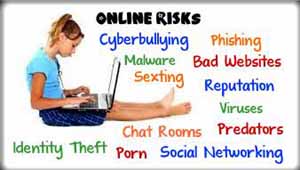'

Risks When Kids Go Online!
What Are the Online Risks?
The internet has changed our lives in mostly positive ways, but it’s not a friendly, safe place if you let your guard down. Parents need to pay attention to what their children are doing online and how they’re behaving online. Here are some of the risks kids online are exposed to:
Advertising: Targeted/Inappropriate – Many social networking sites and apps are free for user’s. Their revenue is based on targeted advertising. These sites, such as Facebook gather user data and then target the user with ads pertaining to the info they’ve collected. Some of the ads may be potentially harmful such as electronic cigarette ads, or dieting ads for teens struggling with eating disorders.
Cyberbullying – Your child is likely to become a victim of cyberbullying (at least 25 percent are), a growing problem for today’s kids. Cyberbullying is the harassment, intimidation and embarrassment of others via computer devices. Cyberbullies post humiliating, sometimes photo-shopped photos mean spirited messages, spread rumors, and make threats toward their victims often anonymously. Click here to learn more.
Inappropriate Websites – The growth of the world-wide-web has been explosive – 861M websites growing by 140K sites daily. There are many great sites, but unfortunately there are many sites that are inappropriate for children. Video chat sites, pro-self harm sites, violent gaming sites, porn etc. You name it… it’s out there online for kids to see. Parents need to consider sites with regard to age as well, i.e. Facebook has an age restriction of 13 and older. Click Here To Learn More
Identity Theft – Stealing a person’s identity by pretending to be that person usually occurs to gain access to resources or obtain credit and other personal information in the victim’s name. Identity theft occurs when someone uses another’s personally identifying information, like their name, identifying number, or credit card number, without their permission, to commit fraud or other crimes. Adverse consequences can happen to the victim if they are held responsible for the crime that the identity thief perpetrated or if the perpetrator is able to gain access to the victim’s financial accounts. In addition, Cyberbully’s have also been known to create a fake account using their victim’s identity to torment them by posting as if they are the victim.
ISIS Recruitment – Tweens and Teens are being recruited on the sites they visit using the same online grooming tactics that predators use to engage vulnerable kids to join them. WhatsApp, Facebook, Twitter and Ask.fm are a few of the sites where the recruitment is taking place. ISIS has especially ramped up its efforts to lure young women — seen as potential brides for its fighters.
Location Tracking – Services, such as Foursquare that track your location can be used for criminal purposes—by online predators or thieves. Geotagging via the many photo-sharing-apps of photos can identify where the photos were taken which can put children at risk from online predators.
Malware – Computer software intended to damage a computer device, or to take partial control over its operation for malicious purposes.
Multitasking – Multitasking online is when a child performs two or more activities or tasks at the same time; such as doing homework, chatting on Facebook and playing a game. Research has shown that multitasking is ineffective. Click here to learn more.
Phishing Scams – A malicious attempt to obtain financial or other confidential information from individuals online, often by sending an e-mail that looks as if it is from a legitimate organization, but contains a link to a fake website that replicates the real one.
Predators – An online predator uses chat rooms, social networking or gaming sites for the purpose of meeting children to engage in sexual activity. Click here to learn more.
Privacy – The online world is not private and anything posted will be in cyberspace forever.
Reputation Damage/Digital Footprint – Reputation is what other’s think of someone or something both offline and online. How we present ourselves to others and how we behave help determine our reputation. Damage to a person’s reputation can be self inflicted or caused by others. Any interaction or anything posted online leaves a Digital Footprint, the trail left behind that creates a permanent impression online. Photos posted from parties showing alcohol use, comments that include profanity and cyberbullying can all affect a person’s reputation and digital footprint. The online world makes it easy for a college recruiter or employer to search an individual’s reputation, especially via social networking sites, which makes it imperative that kids think about the reputation and digital footprint that they are creating online. Once something is posted it’s in cyberspace forever! Click here to learn more.
Sexting – Sexting is the act of sending a semi-nude or nude image via cellphone or other computer device. Tweens and teens are using apps such as SnapChat or a newer app CyberDust to sext because they believe the images they send will disappear. They won’t or can be recovered. This problem is growing for tweens and teens and puts them in harms way both legally and emotionally. Click here to learn more.
Sleep Deprivation – Sleep deprivation is when an individual does not get enough sleep to give their body adequate rest to maintain health, emotionally and physically. Many kids are on the computer into the wee hours of the morning when parent think they’re sleeping, resulting in sleep deprivation. Click here to learn more
Viruses (Malicious Code) – Viruses and other malicious code, often loaded onto a computer device without the user’s knowledge can reveal personal information, destroy data and/or cause the user’s device to participate in spreading malicious code.




